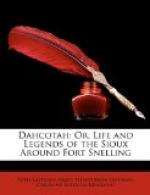“Our warriors, roused from their sleep, determined to find out the cause of the alarm; they were thrust back into their teepees by the bayonets of the long knives, and the voice of the Interpreter was heard, crying, ‘The first Dahcotah that leaves his lodge shall be shot.’
“The soldiers found out from the old chief the teepee of the revellers. The young men did not hear them as they approached; they were drinking and shouting. White Deer had raised the cup to his lips, when the soldier’s grasp was upon him. It was too late for him to fly.
“There was an unopened keg of liquor in the teepee. The soldiers struck it to pieces, and the fire water covered the ground.
“The hands of White Deer were bound with an iron chain; he threw from him his clothes and his blanket. He was a prisoner, and needed not the clothing of a Dahcotah, born free.
“The grey morning dawned as they entered the large door of the fort. His old father soon followed him; he offered to stay, himself, as a prisoner, if his young son could be set free.
“It is in vain, then, that we would contend with the white man; they keep a watch over all our actions. They work in the night.”
“The long knives will ever triumph, when the medicine men of our nation speak as you do,” said Two Stars. “I have lived near them always, and have never been their prisoner. I have suffered from cold in the winter, and have never asked clothing, and from hunger, and have never asked food. My wife has never stood at the gate to ask bread, nor have my daughters adorned themselves to attract the eyes of their young men. I will live and die on the land of my forefathers, without asking a favor of an enemy. They call themselves the friends of the Dahcotahs. They are our friends when they want our lands or our furs.
“They are our worst enemies; they have trampled us under foot. We do not chase the deer on the prairies as eagerly as they have hunted us down. They steal from us our rights, and then gain us over by fair words. I hate them; and had not our warriors turned women, and learned to fear them, I would gladly climb their walls, and shout the war-cry in their ears. The Great Spirit has indeed forsaken his children, when their warriors and wise men talk of submission to their foes.”
CHAPTER II.
Well might Harpstenah sit in her lodge and weep. The sorrows of her life passed in review before her. Yet she was once the belle of an Indian village; no step so light, no laugh so merry as hers. She possessed too, a spirit and a firmness not often found among women.
She was by birth the third daughter, who is always called Harpstenah among the Sioux. Her sisters were married, and she had seen but fourteen summers when old Cloudy Sky, the medicine man, came to her parents to buy her for his wife.
They dared not refuse him, for they were afraid to offend a medicine man, and a war chief besides. Cloudy Sky was willing to pay them well for their child. So she was told that her fate for life was determined upon. Her promised bridegroom had seen the snows of eighty winters.




